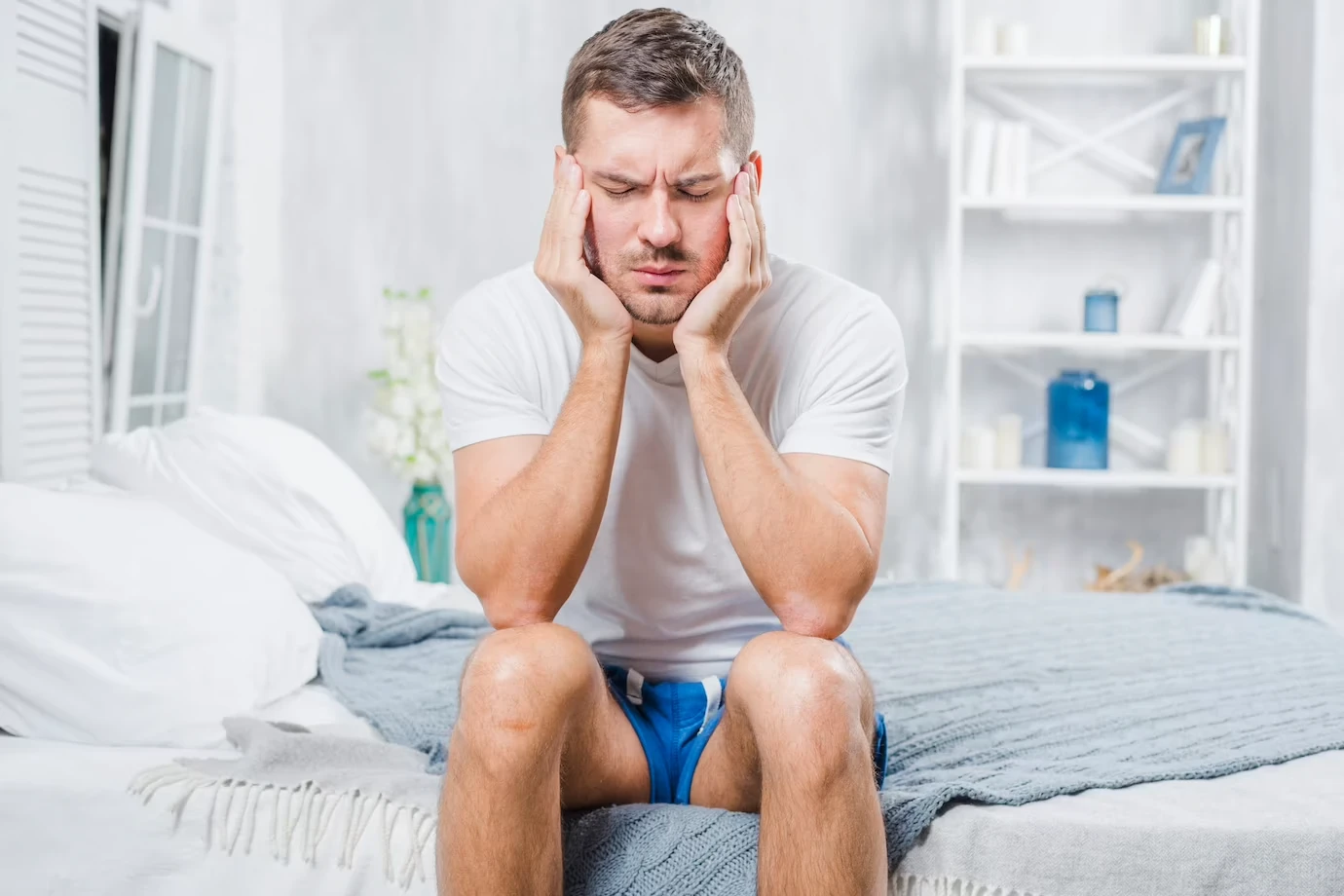Testosterone is a hormone that plays a key role in the development and maintenance of male physical characteristics, as well as in overall health and wellness. Testosterone deficiency, also known as hypogonadism, can have a significant impact on a man’s quality of life. In this post, we will dive deep into understanding testosterone deficiency – what it is, how it affects the body, and what causes it.
We will also explore the symptoms associated with low testosterone levels and who is at risk of developing testosterone deficiency. Additionally, we will discuss various treatment options available for those diagnosed with testosterone deficiency and how to prevent it.
So if you are experiencing any symptoms related to low testosterone or are curious about its effects on male health, keep reading to learn more!
What is Testosterone Deficiency?
Testosterone deficiency, also known as low testosterone or hypogonadism, occurs when the body doesn’t produce enough testosterone. This can lead to symptoms like fatigue, decreased muscle mass, and changes in sexual function. A blood test can diagnose testosterone deficiency, and treatment options include hormone replacement therapy. Consult a healthcare professional for proper diagnosis and treatment.
The Role of Testosterone in the Body
Testosterone, a hormone primarily produced in the testicles in men and ovaries in women, plays a crucial role in the development of male sexual characteristics. It contributes to muscle growth, bone density, red blood cell production, and overall well-being. In women, testosterone helps maintain bone mass, libido, and vitality.
Adequate testosterone levels are vital for optimal physical and mental health. Understanding the role of testosterone in the body is essential for addressing conditions like testosterone deficiency syndrome and making informed decisions regarding testosterone therapy and endocrinology.
Identifying the Symptoms of Low Testosterone
Recognizing the symptoms of low testosterone is crucial for early detection and treatment. Low testosterone can lead to physical changes such as decreased muscle mass, increased body fat, and changes in sexual health like decreased libido and erectile dysfunction. Emotional and mental changes, including depression, irritability, and difficulty concentrating, may also be indicators of low testosterone levels. Consulting a healthcare professional can help determine the underlying cause of these symptoms. Identifying and addressing low testosterone levels early on can improve overall well-being and quality of life.
- Physical Changes
Low testosterone levels can result in various physical changes. Decreased muscle mass, strength, and bone density are common symptoms of testosterone deficiency. Individuals with low testosterone may also experience increased body fat, especially around the abdomen. Reduced facial and body hair growth, as well as decreased bone mass, are other physical changes that can occur. Recognizing these physical changes is crucial in diagnosing testosterone deficiency. It is important to seek medical advice for proper diagnosis and treatment.
- Emotional and Mental Changes
Emotional and mental changes can occur as a result of low testosterone levels, including symptoms such as depression, irritability, and mood swings. Individuals with testosterone deficiency may also experience decreased energy, motivation, and difficulty concentrating. Recognizing these changes is crucial in identifying potential testosterone deficiency.
Consulting with a healthcare professional can help address these emotional and mental symptoms effectively. Treatment options, such as testosterone replacement therapy, can alleviate these symptoms and improve overall well-being. It is important to seek the guidance of an endocrinology specialist or healthcare provider to discuss the best treatment plan for managing emotional and mental changes associated with testosterone deficiency.
- Sexual Health Changes
Low testosterone levels can significantly impact sexual health. Both men and women may experience a decrease in libido or sex drive as a common symptom of low testosterone. Additionally, erectile dysfunction, the inability to achieve or maintain an erection, can also be associated with low testosterone levels. It is crucial to identify these changes in sexual health for the diagnosis and treatment of testosterone deficiency. Seeking medical advice is essential for appropriate evaluation and management.

Who are at Risk of Testosterone Deficiency?
Certain factors increase the risk of testosterone deficiency. Aging is a natural cause, as testosterone levels decline with age. Health conditions like obesity, diabetes, and chronic illness can also raise the risk. Lifestyle factors such as sedentary behavior and poor nutrition contribute too. Early detection is crucial for timely treatment.
- Age and Testosterone Levels
As men age, their testosterone levels naturally decline, often starting around the age of 30. By the time they reach 70, testosterone production can be significantly lower compared to their younger years. This decline in testosterone due to aging can lead to symptoms of testosterone deficiency. For older individuals, regular monitoring of testosterone levels may be beneficial. It is important to consult with a healthcare professional to determine if testosterone replacement therapy is necessary.
- Underlying Health Conditions
Certain health conditions can contribute to testosterone deficiency. Obesity, especially excess belly fat, is associated with lower testosterone levels. Chronic illnesses such as diabetes, kidney disease, and liver disease may also affect testosterone production. Hormonal disorders, such as pituitary gland or testicular disorders, can cause testosterone deficiency.
Identifying and treating underlying health conditions is important in managing testosterone deficiency. It is crucial to address these conditions to restore testosterone levels and improve overall health. By targeting the root causes of testosterone deficiency, such as obesity or hormonal disorders, individuals can find effective solutions and restore hormonal balance.
What Causes Testosterone Deficiency?
There are several factors that can contribute to testosterone deficiency. Lifestyle choices, such as obesity and lack of exercise, can lower testosterone levels. Medical conditions like hypogonadism and prostate cancer can also cause testosterone deficiency. Additionally, age-related hormonal imbalances and certain medications or treatments may lead to low testosterone.
- Lifestyle Factors
Obesity and excess body fat can disrupt hormone production, impacting testosterone levels. Lack of exercise and a sedentary lifestyle also contribute to low testosterone levels. Poor sleep quality and chronic stress can further affect testosterone production. Additionally, an unhealthy diet and nutrient deficiencies may lead to testosterone deficiency.
Substance abuse, including excessive alcohol consumption, can have a negative impact on testosterone levels. Incorporating healthy lifestyle choices, such as regular exercise, sufficient sleep, and a balanced diet, can help maintain optimal testosterone levels.
- Medical Conditions
Testosterone deficiency can be caused by various medical conditions. One such condition is hypogonadism, where the testes produce insufficient testosterone. Prostate cancer and its treatments, such as chemotherapy, can also lower testosterone levels. Genetic disorders like Klinefelter syndrome can result in testosterone deficiency, while chronic illnesses like liver or kidney disease may affect testosterone production. Additionally, endocrine disorders including thyroid problems can disrupt hormone balance and decrease testosterone. These medical conditions can have a significant impact on the levels of testosterone in the body.
How is Testosterone Deficiency Diagnosed?
To diagnose testosterone deficiency, a thorough medical history and physical examination are conducted to assess symptoms and potential causes. Blood tests measure testosterone levels and identify underlying conditions. Other diagnostic procedures may be used to investigate specific causes. Monitoring hormone levels aids in accurate diagnosis.
- Medical History and Physical Examination
During the medical history assessment, the doctor will inquire about symptoms such as decreased libido, fatigue, and erectile dysfunction to evaluate the possibility of testosterone deficiency. Additionally, a physical examination will be conducted to assess secondary sexual characteristics like facial hair and muscle mass.
The doctor will also check for signs of underlying medical conditions or genetic disorders that could contribute to testosterone deficiency. To understand potential causes, the doctor may discuss sexual function and fertility history. The assessment will also take into account risk factors such as age, obesity, and chronic illnesses.
- Blood Tests and Other Diagnostic Procedures
Blood tests are essential in diagnosing testosterone deficiency. Total testosterone levels are measured to confirm deficiency, while free testosterone levels and other hormone levels like LH and FSH help evaluate the condition. These tests also assess overall health markers like red blood cell count and liver function, which can be affected by testosterone deficiency.
Additional diagnostic procedures may include imaging tests to examine the testicles or prostate for abnormalities. In some cases, a semen analysis may be performed to assess fertility potential. Proper diagnosis through these methods is crucial in determining appropriate treatment options.
What are the Treatment Options for Testosterone Deficiency?
Treatment options for testosterone deficiency include hormone replacement therapy, lifestyle modifications, dietary changes, managing underlying medical conditions, and natural remedies. Hormone replacement therapy may involve testosterone injections or gels, while lifestyle modifications can include weight loss and exercise. Dietary changes may involve consuming foods rich in zinc and vitamin D. Managing underlying medical conditions such as hypogonadism or prostate cancer is important. Natural remedies like herbal supplements and stress reduction techniques may also be beneficial.
- Hormone Replacement Therapy
Hormone replacement therapy (HRT) is a treatment option for testosterone deficiency. It involves administering testosterone through injections, patches, or pellets to restore testosterone levels within the normal range and relieve symptoms. The dosage and method of administration are personalized based on individual needs and preferences, and regular monitoring is important to ensure effectiveness and safety.
It is crucial to consult a qualified healthcare professional for prescription and supervision during HRT. By introducing exogenous testosterone into the body, HRT aims to alleviate the symptoms of testosterone deficiency and improve overall well-being.
- Lifestyle Modifications and Natural Remedies
Regular exercise, including resistance training, can enhance testosterone production and promote hormonal balance. Maintaining a healthy body weight through a well-balanced diet and avoiding excessive calorie intake supports optimal testosterone levels.
Adequate sleep and stress management techniques, like meditation or relaxation exercises, positively influence testosterone synthesis. Additionally, incorporating foods high in zinc and vitamin D into your diet can aid in testosterone synthesis. Consider herbal supplements like ashwagandha or Tribulus terrestris for potential benefits in testosterone production.
Can Testosterone Deficiency be Prevented?
There is no sure way to prevent testosterone deficiency, but there are some lifestyle changes that may help keep testosterone levels normal. These include:
- Eating a healthy diet. A diet that is rich in protein, healthy fats, and complex carbohydrates can help to support testosterone production.
- Exercise regularly. Exercise helps to increase testosterone levels by stimulating the production of luteinizing hormone (LH), which is a hormone that signals the testicles to produce testosterone.
- Maintain a healthy weight. Being overweight or obese can lead to low testosterone levels.
- Get enough sleep. Sleep is essential for testosterone production. Aim for 7-8 hours of sleep per night.
- Avoid excessive alcohol and drug use. Alcohol and drugs can interfere with testosterone production.
- Manage stress. Stress can also lead to low testosterone levels. Find healthy ways to manage stress, such as exercise, yoga, or meditation.
If you are concerned about your testosterone levels, talk to your doctor. They can help you determine if you have low testosterone and recommend treatment options, if necessary.
Let’s Sum Up
In conclusion, testosterone deficiency can have a significant impact on your physical, emotional, and sexual well-being. It is important to recognize the symptoms and seek proper diagnosis and treatment. Hormone replacement therapy can be an effective option for restoring testosterone levels, but lifestyle modifications and natural remedies can also play a role in managing the condition.
It is essential to maintain a healthy lifestyle, exercise regularly, manage stress, and get enough sleep to support optimal hormone levels. If you suspect you may be at risk for testosterone deficiency or are experiencing symptoms, consult with a healthcare professional for proper evaluation and guidance.



